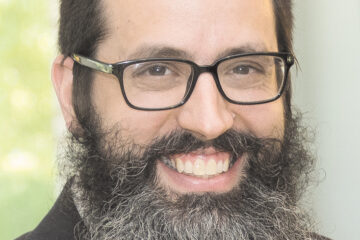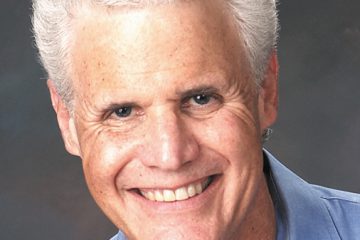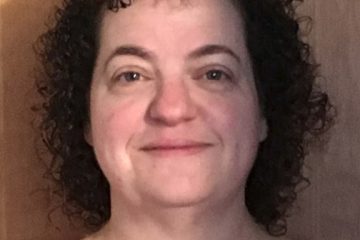Riding life’s roller coaster of Magic and Loss
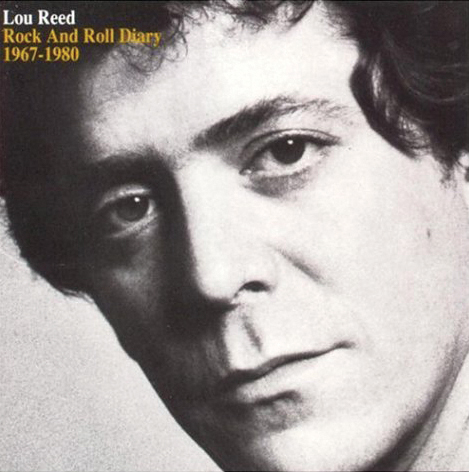
Surprising spiritual advice from Lou Reed’s American-Jewish songbook
By Rabbi Aubrey L. Glazer, Beth Abraham Synagogue
“You can’t depend on your family
you can’t depend on your friends
You can’t depend on a beginning
you can’t depend on an end”
— Lou Reed, Busload of Faith (New York, 1989)
Life can become very routinized and yet feel random — so upon whom and what can you really count on? How can we be continually surprised in our spiritual lives, even as skeptics? Is a “busload of faith” enough?
Let’s explore what it means to ride life’s roller coaster through moments of magic and loss and why it can even in the midst of it remain surprising.
I recall my surprise when I attended the Passover cabaret known as the Downtown Seder at City Winery in New York when Lou Reed was cast as the wise child (chacham) as he read an excerpt from Edgar Allan Poe’s The Raven! Beneath my amazement resonated the words of the remarkable late, great music critic, Ellen Willis, who encapsulated the genius of Lou Reed as early as 1978, that he had “made a fateful connection between two seemingly disparate ideas — the rock-and-roller as self-conscious aesthete and the rock-and-roller as self-conscious punk.”
How could this rock-and-roller as self-conscious aesthete punk who sang about “walking on the wild side” be anything but the wicked child (rasha)? It is nothing short of surprising. Through the years of my own spiritual searching and growth while listening to Lou Reed, I realized he too was searching and growing, always ready to surprise and be surprised.
Many do not realize that Lou Reed grew up as Lewis Allan Reed, (1942-2013). Reed became a somewhat renowned singer-songwriter and sometimes outrageous performer whose songbook overflows with the lyrical landscape meant to shock and surprise. Reed’s songbook is woven from the midst of living in a horrific world after Auschwitz, Hiroshima, Chernobyl. The sobering punch of reality feels interwoven and integrated into our very fabric of being, especially on the mean streets of New York from the 1970s onwards.
But what continues to surprise me is how Lou Reed’s songbook grew and matured with surprising spiritual advice, even as a skeptic who cannot depend on anyone or anything.
Growing up in large part by fleeing from his Long Island suburban upbringing quickly brought Lou to the bowels of New York and his foray into the bohemian world of The Factory, where he encountered countless legends including Andy Warhol that birthed his first musical venture known as the Velvet Underground.
That short period became the stuff of New York arts and culture legends and many of his fellow seekers from then never survived to later chapters in life as did Lou. So one hears the challenges amid the struggles swirling around him through that era in the crucible of surviving beyond it when he sings of needing a Busload of Faith (New York, 1989):
“You can’t depend on intelligence
ooohhh, you can’t depend on God
You can only depend on one thing
you need a busload of faith to get by, watch, baby”
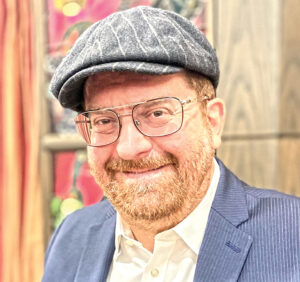
Everyone — even a skeptic — experiences roller coaster highs and lows in life, what the Jewish mystics call ratzo v’shov, and that oscillation really hit Lou, who confessed, “Between two Aprils I lost two friends/Between two Aprils magic and loss…” That is the brief poetic inscription that marks the liner notes of an underappreciated album called Magic and Loss (1992).
Lou also managed to sneak into the credits more heartfelt words of mourning: “This album is dedicated to Doc and especially to Rita.” While Rita remained a mystery, Lou was more explicit about his befriending legendary songwriter Doc Pomus, who died a year prior to this recording. Some of Reed’s most heartfelt lyrics emerged as bittersweet laments forged from the pain he experienced as he witnessed his friends (like Andy Warhol and Doc Pomus) dying, in Power and Glory (Magic and Loss, 1992):
“I saw a great man turn into a little child
The cancer reduced him to dust
His voice growing weak as he fought for his life
With a bravery few men know
I saw isotopes introduced into his lungs
Trying to stop the cancerous spread
And it made me think of Leda and The Swan
And gold being made from lead
The same power that burned Hiroshima
Causing three-legged babies and death
Shrunk to the size of a nickel
To help him regain his breath”
As Lou listened deeply to life’s roller coaster of one of the most prolific songwriters of the 1950s and 1960s, Doc Pomus, he also witnessed how this White Jewish singer on crutches had the courage to sing in blues clubs and never let polio deter his love for music and from beginning his career as a blues singer in the 1940s.
As it happens, in New York, Lou Reed lived a couple of blocks away from Doc Pomus and their friendship revolved around listening to old blues records together and sharing reflections on songs and the art of songwriting. Despite the “isotopes introduced into his lungs,” Pomus passed away after a valiant battle.
While Lou Reed attended Pomus’ funeral, he heard Jimmy Scott singing Someone to Watch Over Me, as per Pomus’ last wishes. Hearing Scott sing that brokenhearted song at Doc’s funeral was one of the most powerful experiences that touched Lou and inspired the lyrics for Power and Glory, on which Scott sings a single refrain, “I wanted all of it,” in this context:
“And I was struck by the power and the glory
I was visited by a majestic hymn
Great bolts of lightning, lighting up the sky
As the radiation flowed through him
He wanted all of it
Not some of it”
To want all of it (hakol) and not settle for some of it is the paradox of being human — as Ecclesiastes quips, “all of life is merest of breaths.”
Many encounters with remarkable people turned into friendships that came and went, but something about each encounter would always inspire Lou’s journey and the memories left a lasting impression.
Despite the brevity of these encounters, Lou learned much from them, and from fellow seekers, especially how to get perspective, as he sang in Perfect Day (Transformer, 1972):
“Just a perfect day
You made me forget myself
I thought I was someone else
Someone good”
No matter how skeptical one may become, Lou’s roller coaster lyrics remind us that deep within any darkness there is still goodness, there is always a moment that shines on. Despite his apparent skepticism that “You can’t depend on your family/you can’t depend on your friends,” nonetheless he felt “struck by the power and the glory/I was visited by a majestic hymn” while watching his friend pass on.
Lou’s friendships teach us still how the enduring importance of such encounters, without beginnings or endings, really remain in the timeless flow of the song.
And if I’ve surprised you by sharing this spiritual advice from the mean streets of New York, if you want to discover why a wise child would walk on the wild side, join us at Beth Abraham Men’s Club brunch Sunday, Oct. 30 to explore another side of this fascinating American-Jewish songbook of Lou Reed: Why would a wise child walk on the wild side?
Who else could be this mysterious chronicler of the misbegotten of New York’s infernal underworld afterhours, revealing the hidden lyrical light of his misfit characters, infusing them with dignity and devotion to authenticity except the lyrical rocker Lou Reed? Come to be surprised.
Related: Beth Abraham’s new rabbi, Aubrey L. Glazer, is here.
To read the complete November 2022 Dayton Jewish Observer, click here.


